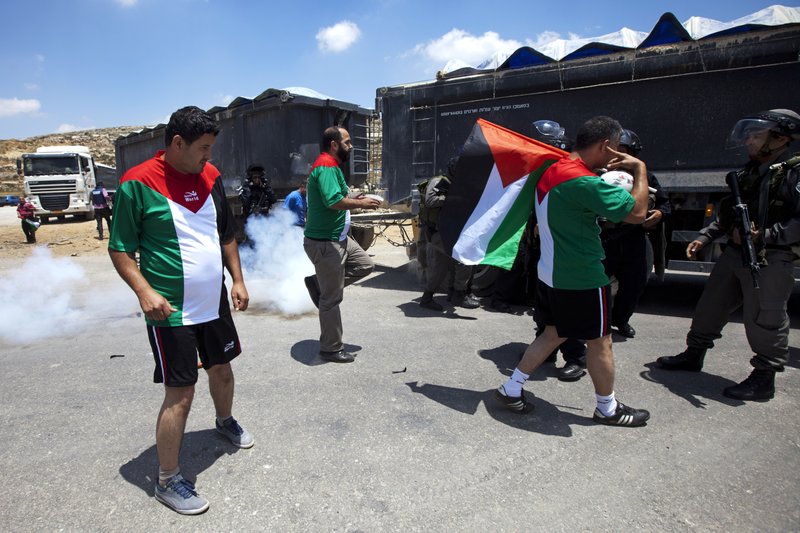JERUSALEM -- The Israeli air force carried out an airstrike Wednesday night in the northern Gaza Strip, killing one person and wounding three others, Palestinian officials said.
The strike was in response to a rocket attack out of Gaza earlier in the day -- the first on Israel since a Palestinian unity government headed by Western-backed President Mahmoud Abbas took office last week.
Palestinian medics and witnesses said the airstrike targeted a man on a motorcycle and also hit a nearby car.
The Israeli military said it had targeted "global jihad-affiliated terrorists," a term it uses to describe Islamic militants who follow the ideology of al-Qaida.
In a statement, Prime Minister Benjamin Netanyahu said Israel had carried out a "precise operation and will continue to act forcefully against those who try to hurt the security of Israel's citizens."
He said he wanted to "remind" the international community that Abbas had pledged the new government would uphold previous agreements with Israel. "This means that he is responsible for dismantling Hamas and other terror groups" in Gaza, Netanyahu said.
Abbas established a technocrat government last week with the militant group Hamas, which had ruled the Gaza Strip. The 17-member Cabinet is to administer Gaza and parts of the West Bank. Hamas backs the unity government but has no members in it.
Earlier, Abbas' office condemned the rocket fire and urged Gaza militants to abide by previous cease-fire deals. Israel dismissed the condemnation as "empty rhetoric."
The U.S., however, welcomed Abbas' words and suggested it wasn't ready to hold the new unity government responsible for the attack.
"We expect the Palestinian Authority will do everything in its power to prevent attacks from Gaza into Israel, but we acknowledge the reality that Hamas currently controls Gaza," U.S. State Department spokesman Jen Psaki said.
Militants in Gaza, including members of Hamas, have fired thousands of rockets at Israel over the years, though Hamas mostly observed an informal truce in recent years. The West considers Hamas a terror group because of its scores of deadly attacks on Israel, though Abbas has said the new Cabinet will follow his pragmatic program.
Israel's deputy defense minister, Danny Danon, had called on Netanyahu to retaliate for Wednesday's rocket attack by withholding transfers of taxes Israel collects on behalf of the Palestinians.
"This rocket fire is the direct result of the Hamas-supported government" Danon said.
The unity government was meant to end a split between Hamas and Abbas' Palestinian Authority, but the road to reconciliation has been bumpy, with many issues unresolved.
Salary payments for more than 40,000 government employees hired by Hamas during the past seven years are a key point of contention. Hamas wants them to be paid by the unity government, which largely depends on aid from other countries.
Hamas kept Gaza's banks closed for the past week to pressure Abbas to find a solution, but allowed the banks to reopen Wednesday as public anger rose against the group. Long lines formed at cash machines as people rushed to withdraw salaries.
Tens of thousands of Abbas loyalists who worked for the Palestinian Authority in Gaza before the Hamas takeover have continued to receive salaries since 2007 on condition they not work for the Hamas administration.
Hamas officials said no solution to the problem has been found and suggested the opening of the banks is temporary.
Meanwhile, Palestinian protesters in the West Bank found a timely way to show support for dozens of Palestinian hunger-strikers in Israeli jails. A day before the start of the World Cup in Brazil, they dressed up in the jerseys of the Palestinian soccer team and kicked a ball around outside Ofer, an Israeli lockup in the West Bank.
A group of helmeted soldiers prevented them from advancing. Troops fired stun grenades and pushed some of the protesters, who dribbled and kicked the ball over the soldiers' heads.
Some of the Palestinian prisoners began a hunger strike April 24, with others joining later, and more than 70 have been hospitalized. The hunger strikers demand that Israel end the practice of administrative detention, under which nearly 200 Palestinians are currently held without charges.
Also Wednesday, pathologists performed an autopsy on the exhumed body of a 17-year-old Palestinian who was killed May 15 during a lull in a confrontation between Israeli troops and Palestinian stone-throwers.
The Israeli rights group B'Tselem said at the time that security camera footage and witness testimony raised suspicions he was killed in a willful shooting.
The teen's body was exhumed early Wednesday and taken to a Palestinian forensics institute. The autopsy was conducted by the chief Palestinian pathologist and was attended by two Israeli pathologists and two from abroad, said Sarit Michaeli of B'Tselem.
Information for this article was contributed by Mohammed Daraghmeh of The Associated Press.
A Section on 06/12/2014


